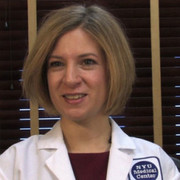EmpowHer:
What is the Women’s Health Initiative?
Dr. Nieca Goldberg
Sure, five years ago, results of the very important Women’s Health Initiative were released. The Women’s Health Initiative was a large research study where the role of estrogen and the combination of estrogen and progesterone, synthetic forms of the drug, were evaluated on a variety of chronic, on the prevention, whether or not they prevented a variety of chronic diseases, like heart disease, colon cancer and blood pressure, high blood pressure, cholesterol, and what the researchers found is that the hormone therapy did not reduce the risk of heart attack and stroke.
In fact, the estrogen portion of the study shows that there was a slightly increased risk for stroke. The problem with the study is they only studied one form of hormone replacement and the women were not younger women who were in their late 40s or early 50s, just going in to menopause, they were women who had been in menopause for at least 10 years.
So that a question arose amongst physicians like myself as well as researchers that perhaps the study was not addressing the issue of hormone therapy for women who were actually going to take it for menopausal symptoms which is actually the indication for hormone therapy.
EmpowHer:
And I understand that only covered estrogen and progesterone.
Dr. Nieca Goldberg:
That’s right, it only incorporated either estrogen, which is used in women who have had a hysterectomy or the combination of estrogen and progesterone, which is used in women who still have a uterus. You use the combination because you want to protect against uterine cancer. Estrogen alone in someone who has the uterus, increases risk for uterine cancer.
We’ve had some additional information over the last year to show very surprisingly that younger women who were on hormone therapy actually had a lower rate of heart disease and it may very well be that their lower rate of heart disease is because they were more likely to be free of heart disease at the beginning of the study.
Those older women never had an evaluation for their arteries to see if they had any buildup of cholesterol or silent heart disease so that it’s unclear it may be the women in the study who had a problem, may be they already were at high risk for heart disease to begin with.
So the real problem now is women who are very concerned and very frightened to take hormone therapy and have menopausal symptoms that keep them from sleeping and make them very uncomfortable.
My advice to them as a cardiologist is if you have menopausal symptoms that are making you anxious and keeping you from sleeping and thinking you want to go on hormone therapy then you should discuss it with your doctor and also it’s a good time to have your heart disease risk factor evaluated.
I am trying to make women’s healthcare more complete and easier to access because women are very, very busy. They’re taking care of their family, they’re taking care of their spouses and significant others and maybe their parents and often times they put themselves last. They don’t take the time to really go for their yearly physicals or even their gynecologic exam.
Nieca Goldberg M.D., cardiologist, author of the award winning book "Women Are Not Small Men: Life Saving Strategies for Preventing and Healing Heart Disease" recently started her own practice "Total Heart Care" in Manhattan. She is the former Chief of the Cardiac Rehabilitation and Prevention Center at Lenox Hill Hospital and a national spokesperson for the American Heart Association.
During her time at Lenox Hill, Dr. Goldberg founded the "Women's Heart Program" the only cardiac rehabilitation and prevention program for women in New York City.
In addition, she holds the positions of Co-Medical Director of the 92nd Street Y Cardiac Rehabilitation, and Assistant Clinical Professor of Medicine at the New York University School of Medicine.


